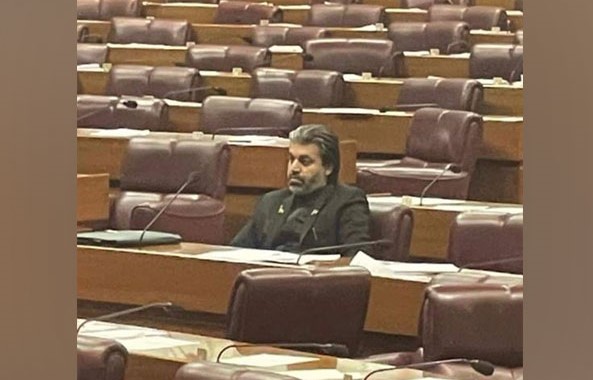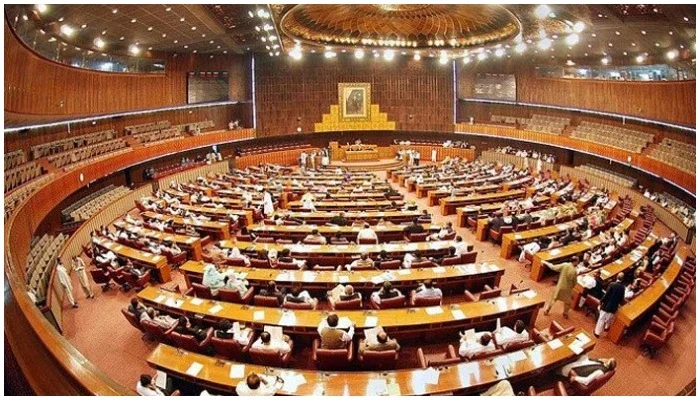Acting Speaker Qasim Soori's move to change the date of the National Assembly session has been challenged in the High Court and the court has fixed Friday for hearing the petition.
A larger bench headed by Chief Justice Athar Minallah and comprising Justice Amir Farooq and Justice Babar Sattar will hear the petition filed by PML-N National Assembly member Murtaza Javed Abbasi on Friday.
The petition said that the April 13 circular issued by the Deputy Speaker in which the meeting was adjourned till April 22 was unconstitutional.
The Acting Speaker should be directed to convene an immediate meeting for the election of the Speaker of the National Assembly.
The petition further said that the Secretary of Parliamentary Affairs and the Secretary Assembly should be directed to convene a meeting on April 16 and the Deputy Speaker should be restrained from exercising the powers of the Speaker of the National Assembly.
Deputy Speaker Qasim Suri, Secretary of Parliamentary Affairs, and Secretary Assembly have been made parties in the petition.
Why do you want the Deputy Speaker to delay the meeting?
Following the change of government in Pakistan, the former ruling Pakistan Tehreek-e-Insaf (PTI) announced its resignation from the Assembly. In this regard, important leaders of PTI had also shared their resignations on social media.
It was later learned that not only the deviant members but also some other members had not resigned.
Talking to Urdu News, Acting Speaker Qasim Suri had said that he would accept the resignations of the members himself.
According to a notification issued by the National Assembly Secretariat, the Acting Speaker has accepted the resignations of 123 members of PTI and a gazette notification has been sent to the Election Commission to declare their seats vacant.
It may be recalled that the number of PTI members is 155 in which apart from 20 deviant members, 12 other members also did not resign including one Deputy Speaker Qasim Khan Suri.
National Assembly officials said that the Acting Speaker was initially informed by the Secretariat officials that verification of resignations and signatures by calling all the members individually was a legal requirement.
However, he rejected the argument of the authorities, saying that everyone had made the announcement while standing in the House, so there was no need for individual confirmation.
According to officials, the deputy speaker also extended the date of the meeting as he was awaiting the resignations of the remaining members.
However, after the hearing of the case in the High Court yesterday, it was decided to accept the resignation.
He feared that the court might bar him from exercising his powers as speaker.
Extension of the meeting date, what does the law say?
National Assembly officials, speaking on condition of anonymity, told Urdu News: Voting is mandatory. Therefore, their move to postpone the date of the meeting is not in accordance with the law.
Officials say that whenever the competent authority makes a decision, government officials give their input, but the decision rests with the competent authority and until the no-confidence motion is voted on, it is up to the speaker. Are in-office That is why they are the competent authority. "
The Acting Speaker changed the schedule of the meeting by exercising the powers conferred on him under sub-section 2 (b) of Rule 49 of the Rules of Procedure of the National Assembly 2007.
According to officials, "According to the rules of the National Assembly, although the no-confidence motion must be voted on after seven days,
this is the first time that a no-confidence motion has been filed against the deputy speaker and he is also the acting speaker."
In this case, the Rules are silent on whether they can exercise the powers vested under sub-section 2 (b) of Rule 49 of the Rules of Procedure of the National Assembly 2007.
How can an Assembly seat be vacant?
According to the rules of the National Assembly, under Rule 43, any member of the National Assembly can submit a handwritten resignation to the Speaker under Article 64 of the Constitution.
If any member submits his / her resignation and informs the Speaker about his / her resignation and the Speaker is not aware of any pressure on the member concerned to resign, he/she will accept his / her resignation.
If the Speaker has any information that the member concerned is resigning under any pressure, he will accept the resignation after being satisfied with the information obtained through himself, the Assembly Secretariat, or any other agency.
Even if the resignation has been sent by the concerned member through any other means, it will be accepted only after the Speaker obtains the information and summons the concerned member, and is satisfied that the resignation has been submitted voluntarily.
After the resignation is accepted, the Secretary National Assembly issues a notification and sends it to the Election Commission to declare the seat vacant. Based on this notification, the Election Commission declares the seat vacant.
Experts say that if Qasim Suri had not accepted the resignations before the election of the new speaker, the new speaker would have been obliged to call the members one by one and confirm them.






